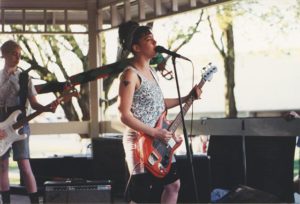
Kathleen Hanna and Bikini Kill.
Kathleen Hanna and Bikini Kill’s music hasn’t been forgotten, and their values are still embedded into many musicians and their work, and rightly so.
The Riot Grrrl movement proved that music is fluid and has no barriers or limits of who is making it and who is listening to it. Music is a universal communicator and should be used to its potential. To talk about feminism and equality, and in turn expressing real emotion.
This has been the beating heart for many musicians, and isn’t exclusive to punk music. Take Beyonce for example. An icon, a songstress, an outspoken feminist, Beyonce is confident in her own skin and has complete ownership over her body at all times. The singer is able to style herself in a way that she is comfortable, and empowers every type of woman in her lyrics. She has become a symbol of strength.
Then there’s Tove Lo, the Swedish “Cool Girl” who thinks taboo itself is a taboo word. Her latest album, Lady Wood, explores sexuality with an open mind. Expressing her needs, desires and thrills, Tove Lo doesn’t shy away in the sheets and encourages other women to speak openly about their own sexuality. In the same vein is Miley Cyrus, who does what she wants, when she wants to.
Jenny Hval’s latest album, Blood Bitch, is dedicated entirely to menstruation. A standout from the male dominated pelvic thrusts of male dominance in music, she pants frantically and haunts in a half witch, half angelic vocal that discusses blood and vampires. It’s a brave and bold move from the Norwegian artist.
Kate Nash, too. The quirky pop singer runs an online club called the “Girl Gang” where she joins members, of any gender, in virtual conversations about hobbies, skills and interests. Her songs helped many come of age, highlighting the awkwardness of teenage love and the importance of friendship.
Today’s icons aren’t just soloists, either. Yet it’s weird that so much attention is bought to a front-woman; it’s seen as more of a novelty. The Pretty Reckless are fronted by Taylor Momsen, and they have the most number ones by a female-fronted rock band. But should this be a point of conversation? Or the music just accepted as music, regardless of who provided vocals?
There are a host of woman-fronted and full-woman bands across all genres. In punk and rock bands there is Millie Manders, Misty Miller, Hinds, Skating Polly and Tacocat to name just a few. Though they may have similarities to the original Riot Grrrls in their image and their lyricism, is simply labeling them a “Riot Grrrl band” the musical equivalent of comparing every female author to Jane Austen?
The movement has developed and evolved with modern times, and it’s had to deal with many changes. Women today face new problems, like the rise of social media adding extra pressure to body image expectations, and the prejudices attached. Women too continue to face difficulties in the workplace, often considered a lesser to their male co-workers.
Though women today also take big steps to change. We are fighting hard for equality and on the flip side of social media, women are given a platform to use their voice and express their political stances and sexuality.
So, I thank you, women across the world. The women who write and perform expressive songs, the women who talk openly about feminism, the women who show endless support to others.
-Tanyel Gumushan
Take-Over Blogger
Alternative Girl
